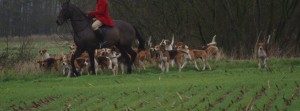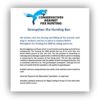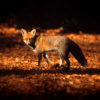
Scottish foxhunting review calls for stronger legislation
Lord Bonomy urges government to amend law with greater consistency and appoint independent monitors to observe hunts
Landowners in Scotland should be held legally responsible for hunts on their property, with hunt activities observed by independent monitors and governed by a new code of practice, according to a review of Scotland’s foxhunting legislation.
Campaigners immediately welcomed the “robust and detailed” report by Iain Bonomy, which was commissioned by the Scottish government last December after significant concerns were raised about loopholes in the law.
Since Scotland became the first in the UK to ban traditional foxhunting and hare coursing in 2002, it has been illegal to hunt a wild mammal with a dog.
But hunts in Scotland can continue to kill foxes by practising an exemption to the Protection of Wild Mammals (Scotland) Act called “flushing to guns”, which means using dogs to chase foxes from beneath cover in order to shoot them.
Covert video surveillance by the League Against Cruel Sports last year alleged that half of Scotland’s hunts were exploiting this exemption.
The report, which was published on Monday, agrees there was law breaking under the ban, and further argues that current legislation “complicates unduly” the detection, investigation and prosecution of alleged offences.
Recommending the law be amended with greater consistency and clarity, Lord Bonomy also asks the Scottish government to consider the appointment of independent monitors to observe the activities of hunts on a random basis, a code of practice for the conduct of hunt activities, and whether a landowner who permits a hunt to ride over his land would be vicariously liable if someone involved in the hunt committed an offence.
The report also highlights a submission to the review by Police Scotland, which warned that exceptions to the offence were being exploited by those determined to continue hunting with dogs, and that lack of clear definition in the legislation created confusion.
The League Against Cruel Sports welcomed the vicarious liability recommendation as adding an extra layer of scrutiny that would “force landowners to question the motivations of hunts”.
Robbie Marsland, the League’s Scotland director, said: “Lord Bonomy and Police Scotland agree there is abuse and exploitation of the current law, which the review proposes to address with robust new legislation and stronger enforcement. This will not only change the face of hunting in Scotland – it sends a powerful signal to Westminster how illegal hunting can be tackled forcefully.”
Calling on the Scottish government to strengthen the law before the end of the current foxhunting season in March 2017. Marsland said: “Public opinion in Scotland wants to see foxhunting banned, the government thought they had banned it and now Lord Bonomy and Police Scotland reveal that the hunts are running a coach and horses through the legislation.”
Holyrood’s environment secretary, Roseanna Cunningham, said the Scottish government would make its response next year, adding: “Back in 2002, Scotland led the way in addressing animal welfare concerns and we remain committed to ensuring the highest levels of welfare for our wild animals.”
While disputing the suggestion that there was any problem with enforcement of current legislation, Scottish Countryside Alliance director Jamie Stewart said: “We are pleased that the inquiry has recognised the importance of gun packs for fox control and has rejected unjustified calls for further restrictions.”
In July 2015, David Cameron was forced to shelve the government’s plans to relax the foxhunting ban in England and Wales after Nicola Sturgeon confirmed that the Scottish National party would vote against the move, rather than abstaining as the Conservatives had hoped.
The SNP leader said she had changed her mind about intervening in an English matter partly because of the strength of feeling in England against relaxing the ban, partly because Scotland was thinking about strengthening its own ban and partly as an act of defiance against the way Cameron had treated the SNP and Scotland since the general election.






